Almost as an afterthought to its March 2010 proclamation that manufacturer compliance with new expanded in-plant regulation originally billed as voluntary would, henceforth, be “not voluntary,” HUD has recently announced that it intends to proceed with a new rule that would institutionalize that expansion and, at the same time, substantially alter existing regulations defining the pivotal relationship between third-party Primary Inspection Agencies (PIAs), manufacturers and HUD. What is worse, is that HUD plans to institute rulemaking on this major and costly alteration of the existing in-plant regulation structure without a consensus of the Manufactured Housing Consensus Committee (MHCC) and without even presenting a complete proposal to the MHCC as required by law and as requested by the MHCC itself. Indeed, the story of how this has come about is a textbook reflection of HUD’s efforts over the past decade to minimize, circumvent and evade the program reforms of the Manufactured Housing Improvement Act of 2000, and a case study for Congress when it examines the Department’s failure to fully and properly implement that law.
Back in 2008, HUD approached the MHCC with “concepts” for changing the fundamental role of third-party PIAs (and particularly private PIAs) as well as the nature of their relationship with both manufacturers and HUD. These “concepts” ultimately led to HUD proposed revisions to elements of the Procedural and Enforcement Regulations (PER), that were presented, in piecemeal fashion, to the MHCC Regulatory Enforcement Subcommittee. That process, however, was halted by a vote of the Subcommittee in September 2008, based on MHARR objections that the consideration of piecemeal proposals – that did not allow a complete evaluation of the interaction between various components – was improper, as was the consideration of such proposals without relevant cost information or justification as required by the 2000 law.
Confronted with this rejection, HUD responded with a three-pronged strategy. First, beginning in late 2008, it embarked on a campaign to expand and fundamentally change in-plant regulation on the ground, without first complying with the due process requirements of the 2000 law, based on an elaborate series of “enhanced checklists,” “field guidance” documents and “standard operating procedures” that were not – and still have not been – presented to the MHCC for consensus review or published for notice and comment rulemaking. Initially, and for nearly a year-and-a-half afterward, HUD characterized the major changes implemented by these documents as a process of “voluntary cooperation,” only to ultimately deem them “not voluntary” in March 2010. An August 24, 2011 article in the Capitol newspaper “The Hill” aptly describes this type of process (being used increasingly by regulators), stating: “Th[e] new guidelines are supposedly ‘voluntary,’ but don’t be fooled. The federal government … has long been engaged in an egregious and unconstitutional regulatory power grab. The strategy simply is to saddle disfavored industries with regulations disguised as ‘voluntary,’ and therefore not subject to the normal rulemaking process and judicial review.” Although written about a different set of “voluntary” guidelines, the same logic and analysis holds here.
Second, in 2009, HUD returned to the MHCC with a unified regulatory proposal to amend the PER regulations in a way that would legitimize and provide legal support for such “on the ground” expanded in-plant regulation. In a formal September 2009 letter ballot, however, HUD was unable to secure an MHCC consensus on this proposal, specifically due, as reflected by MHCC minutes, to the Department’s failure to provide the Committee with adequate justification showing the need for such changes, as well as its failure to provide concrete information regarding the cost-impact of its proposal.
Third, when MHARR continued its objections to the “on the ground” imposition of such a costly regulatory expansion without compliance with relevant due process protections, HUD, on February 5, 2010, issued an “interpretive rule,” without opportunity for public comment, designed to ensure that the MHCC would never get an opportunity to review its expanded in-plant regulation checklists, “field guidance” and standard operating procedures, by simply reading catchall section 604(b)(6) – requiring MHCC consideration and related rulemaking for any change in “inspection practices” – out of the 2000 law.
Now, HUD is taking the next step to institutionalize expanded in-plant regulation. As announced by HUD regulators at an August 17, 2011 meeting of the MHCC’s Regulatory Enforcement Subcommittee, the Department plans to go forward with a proposed rule relating to the role and activities of the PIAs without further consultation with the MHCC, despite the absence of an MHCC consensus due to HUD’s own failure, in 2009, to provide justification and cost information that the MHCC is required to consider by the 2000 law. Questioned about this procedure, HUD’s representative stated that the MHCC had “had its chance” in 2009.
This stance, however, flouts (once again) the requirements of the 2000 law. Section 604(b) of the law requires that the MHCC consider every proposed PER regulation, absent a declared emergency. Further, section 604(e) of the law requires that the MHCC consider the cost-impact and justification for any such proposed regulation. The MHCC, however, has never been provided with this requisite information by HUD. As a result, there are two possible scenarios in this matter, both of which violate the 2000 law – (1) if HUD’s new proposal is in any way different from the proposal that failed to attain an MHCC consensus in 2009, then it has never been considered by the MHCC and violates section 604(b); (2) if the new proposal is identical to the 2009 proposal, it still has not been properly presented to and considered by the MHCC in accordance with the law, because mandatory elements required for MHCC consideration in accordance with the law – cost-impact data and a showing of justification – were never provided. Put differently, if HUD’s position were correct, the Department could effectively evade the consensus requirements of the 2000 law on every proposal simply by refusing to provide the MHCC with cost-impact, justification, or other information needed or required for MHCC review and consensus comments.
HUD, in an attempt to minimize this further restriction of the role and authority of the MHCC and its own obligation to comply with the due process requirements of the 2000 law, noted that Committee members could submit comments during the public comment period on the proposed rule, but this misses the central point of the MHCC and the 2000 law – that regulatory changes should be based on the consensus agreement of all program stakeholders. And there is not – and never has been — a consensus on any changes relating to the role of the PIAs or an expansion of in-plant regulation. Simply stated, a federally-regulated industry that has lost more than 80% of its production over the past 12 years, should not allow this kind of incremental evasion of the law.
In MHARR’s view, this proposal, a vestige of prior program management that sought to minimize and bypass the reforms of the 2000 law, should be withdrawn by the new program management and re-submitted to the MHCC, this time with proper cost-benefit information and specific justification – if one exists.
MHARR VIEWPOINT
By Danny D. Ghorbani
Manufactured Housing Association for Regulatory Reform (MHARR) is a Washington D.C.-based national trade association representing the views and interests of producers of federally-regulated manufactured housing.



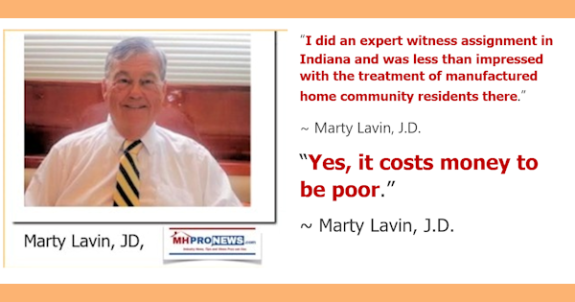
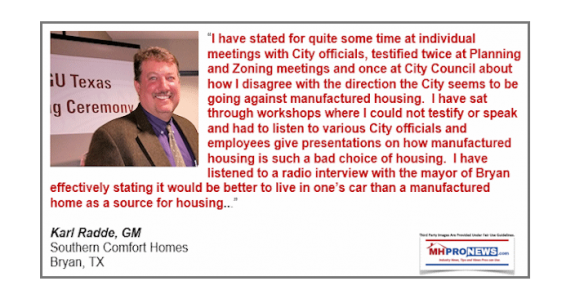
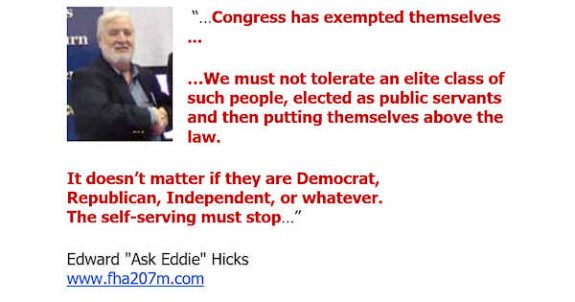
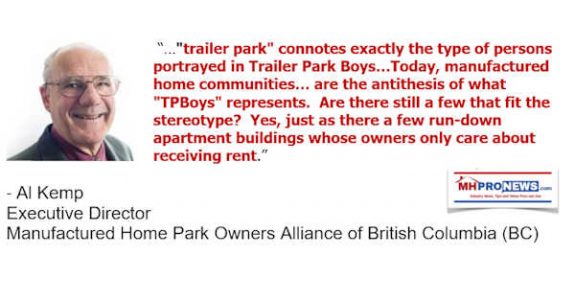
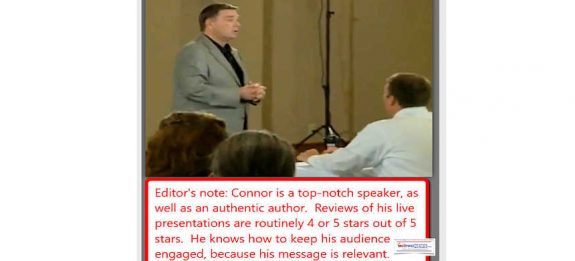
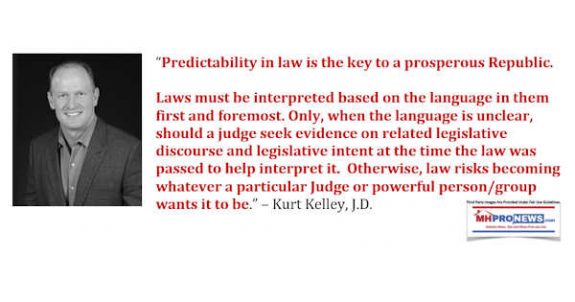
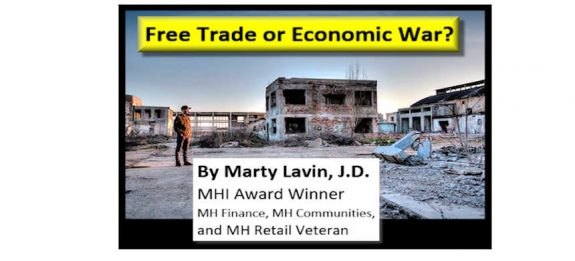
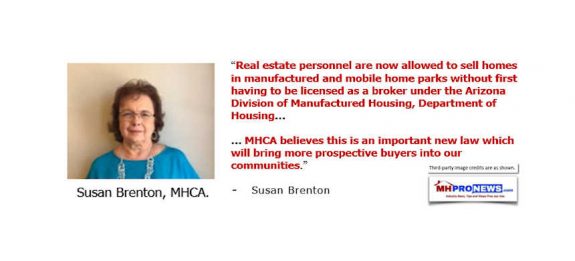
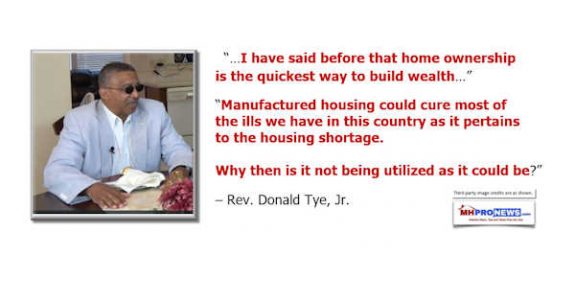
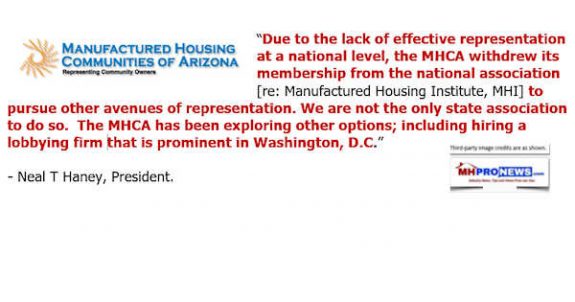
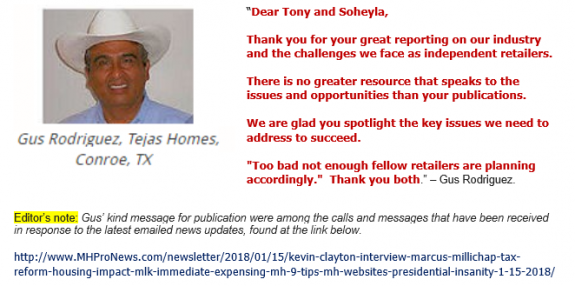
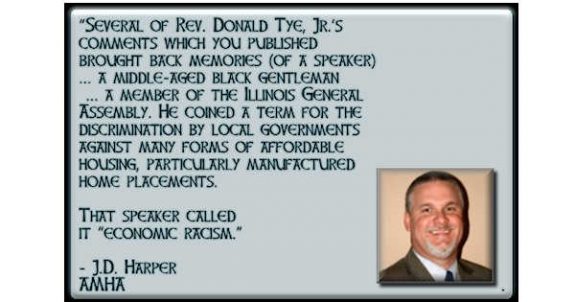
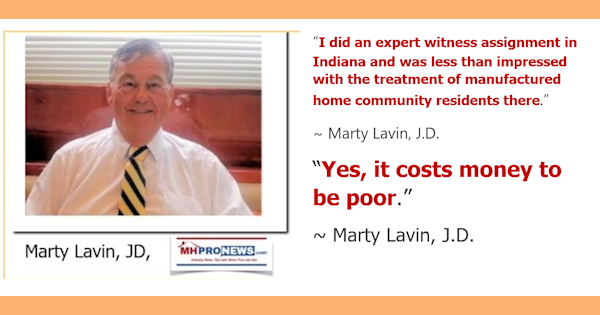
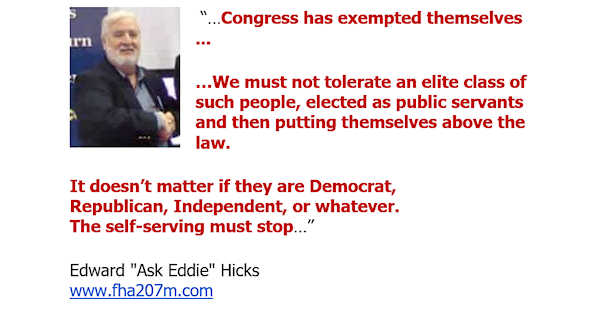
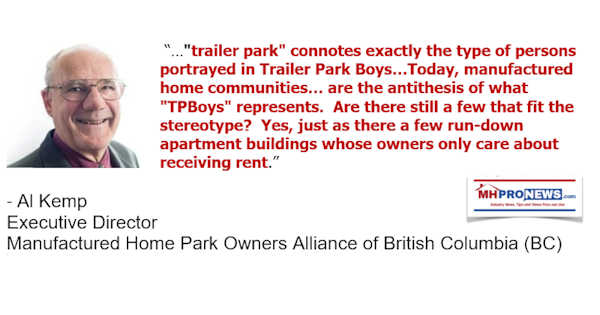
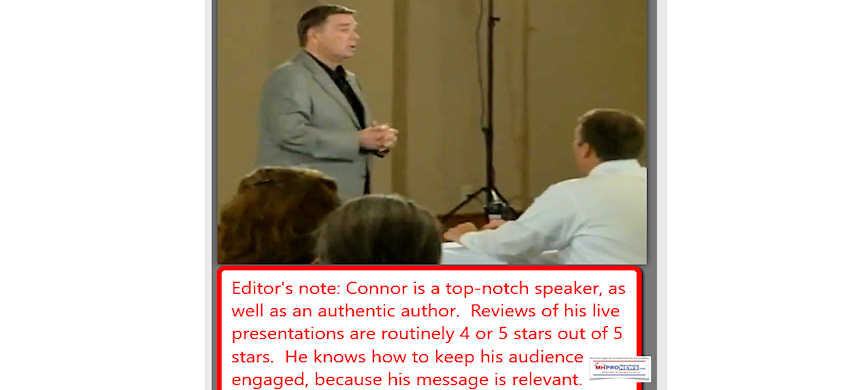
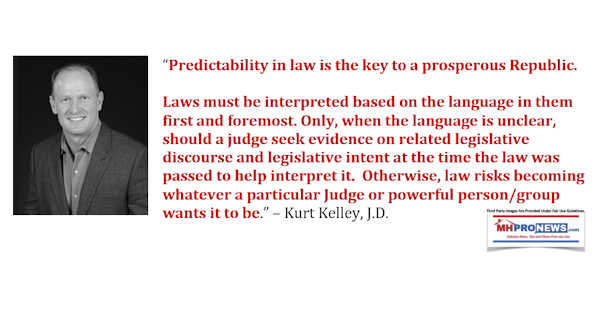
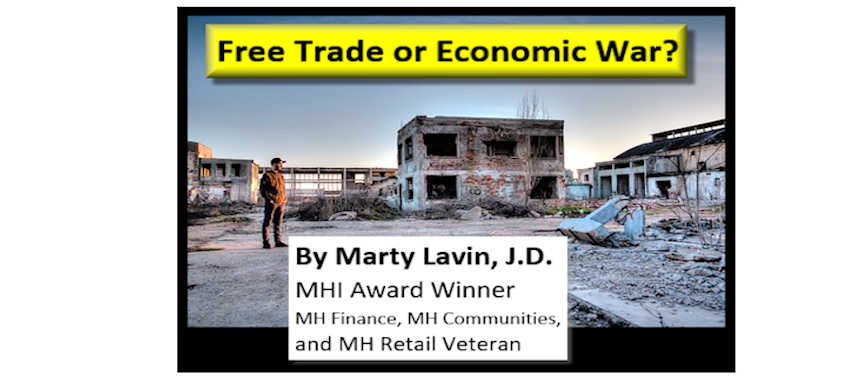
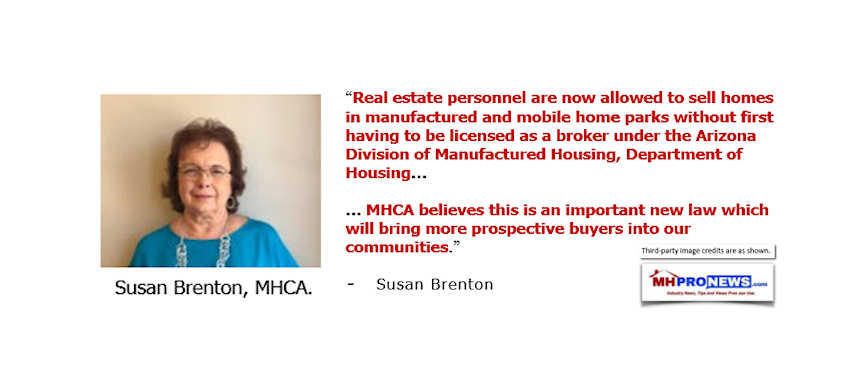
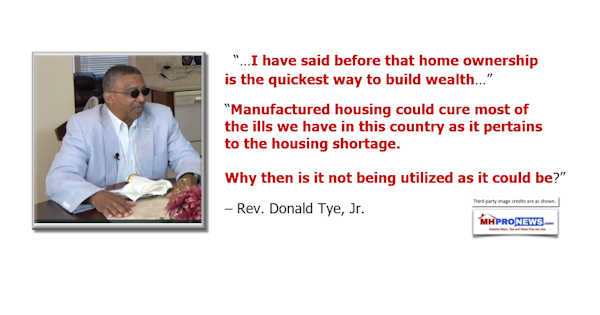
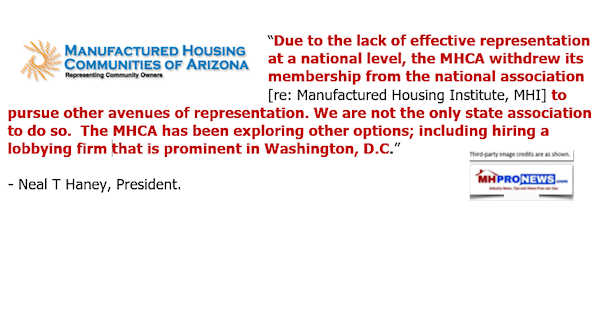
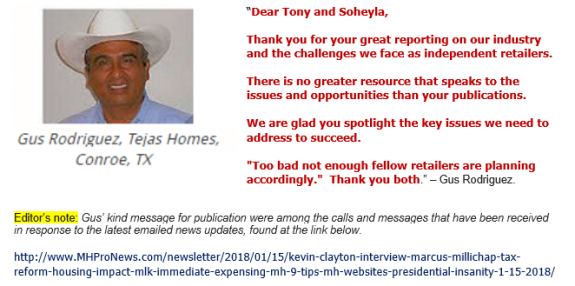
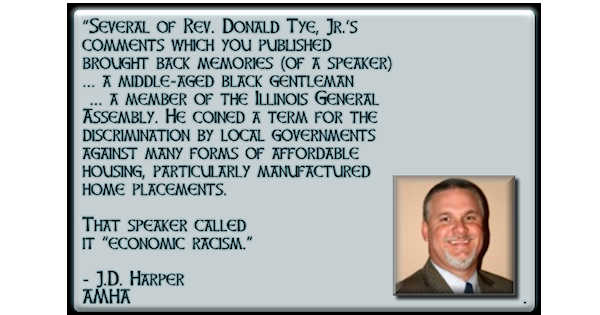
Karl Radde – TMHA, MHI, Southern Comfort Homes – Addressing Bryan City Leaders, Letter on Proposed Manufactured Home Ban
To All Concerned [Bryan City Officials, Others]: As the retail location referenced by Mr. Inderman, I would like to take a moment to address the …